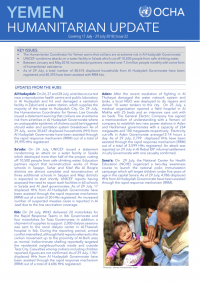Yemen Humanitarian Update Covering 17 July – 29 July 2018 | Issue 22
KEY ISSUES:
• The Humanitarian Coordinator for Yemen warns that civilians are at extreme risk in Al Hudaydah Governorate.
• UNICEF condemns attacks on a water facility in Sa’ada which cut off 10,500 people from safe drinking water.
• Between January and May 2018, humanitarian partners reached over 7.5 million people monthly with some form of humanitarian assistance.
• As of 29 July, a total number of 48,574 displaced households from Al Hudaydah Governorate have been registered and 40,393 have been assisted with RRM kits.
UPDATES FROM THE HUBS
Al Hudaydah: On 26, 27 and 28 July, airstrikes occurred near a reproductive health centre and public laboratory in Al Hudaydah and hit and damaged a sanitation facility in Zabid and a water station, which supplies the majority of the water to Hudaydah City. On 29 July, the Humanitarian Coordinator for Yemen, Lise Grande issued a statement warning that civilians are at extreme risk from airstrikes in Al Hudaydah Governorate where an unstoppable epidemic of cholera could be triggered should water and sanitation system breakdown. As of 29 July, some 30,647 displaced households (HH) from Al Hudaydah Governorate have been assisted through the rapid response mechanism (RRM) out of a total of 39,995 HHs registered.
Sa’ada: On 24 July, UNICEF issued a statement condemning an attack on a water facility in Sa’ada which destroyed more than half of the project, cutting off 10,500 people from safe drinking water. Education partners report that reconstruction works of three schools in Saqayn, Sahar and Kitaf Wa Al Boqe’e districts are almost complete and reconstruction of three additional schools in Saqayn and Majz districts is expected to start shortly. UNICEF reports having assessed the need to repair wash facilities in 60 schools in Sa’ada and Al Jawf governorates. As of 29 July, 17 displaced HHs from Al Hudaydah Governorate have been assisted through the rapid response mechanism (RRM) out of a total of 30 HHs registered. An increased number of suspected measles cases is reported in Al Jawf due to the low vaccination coverage.
Ibb: On 24 July, WHO delivered 20 motorbikes for the Rapid Response Teams in Ibb Governorate and four motorbikes for Taizz Governorate. In addition, a shipment of supplies to support 2,000 dialysis sessions was sent to the renal dialysis center in Al-Thawrah hospital in Ibb. During the reporting period, armed conflict intensified, although field reports referred to the civilian movement up to the proximity of Al-Barh area as normal. Indiscriminate shelling reportedly targeted the residential neighbourhoods inside and outside Taizz City. Casualties among civilians including children reported, figures are not confirmed. As of 29 July, 1,961 displaced HHs from Al Hudaydah Governorate have been assisted through the rapid response mechanism (RRM) out of a total of 4,686 HHs registered.
Aden: After the recent escalation of fighting in Al Thuhayat damaged the water network system and tanks, a local NGO was deployed to do repairs and deliver 10 water tankers to the city. On 25 July, a medical organization opened a field hospital in Al Mokha with 25 beds and an intensive care unit with six beds. The General Electric Company has signed a memorandum of understanding with a Yemeni oil company to establish two new power stations in Aden and Hadramaut governorates with a capacity of 264 megawatts and 100 megawatts respectively. Electricity cut-offs in Aden Governorate average12-14 hours a day. As of 29 July, 2,799 displaced HHs have been assisted through the rapid response mechanism (RRM) out of a total of 3,599 HHs registered. An attack was reported on 29 July in Al Rebat IDP informal settlement in Lahj Governorate with one casualty confirmed.
Sana’a: On 29 July, the National Center for Health Education (NCHE) organized a two-day awareness course to launch the national polio immunization campaign which will target children under five years of age in the capital Sana’a. As of 29 July, 4,986 displaced HHs from Al Hudaydah Governorate have been assisted through the rapid response mechanism (RRM).
MORE PEOPLE ARE REACHED BY THE HUMANITARIAN OPERATION IN YEMEN
Despite a difficult operating environment, between January and May 2018, some 169 international and national partners actively coordinated to assist people with the most acute needs in priority districts across Yemen’s 22 governorates. Together they have assisted over 7.5 million people monthly with some form of humanitarian assistance. In May, humanitarian organisations provided emergency food assistance to 7.5 million people — more than twice the number of people reached over a year ago.
Water, sanitation and hygiene services that benefited 6.3 million people — a 60 per cent increase since January 2018. The number of people receiving health services has risen by 50 per cent during the same period.


